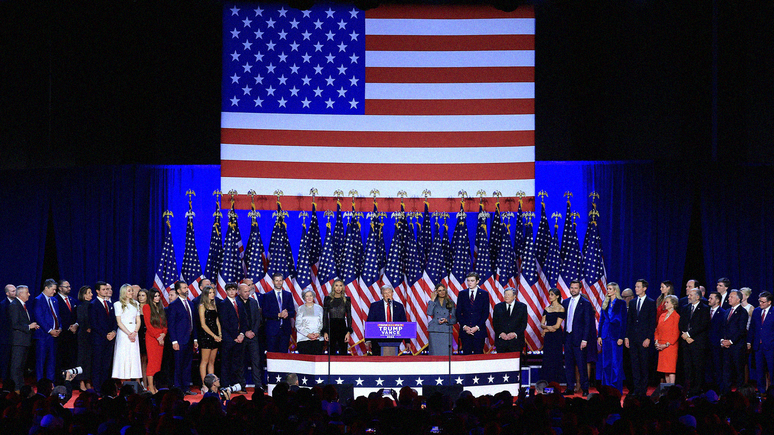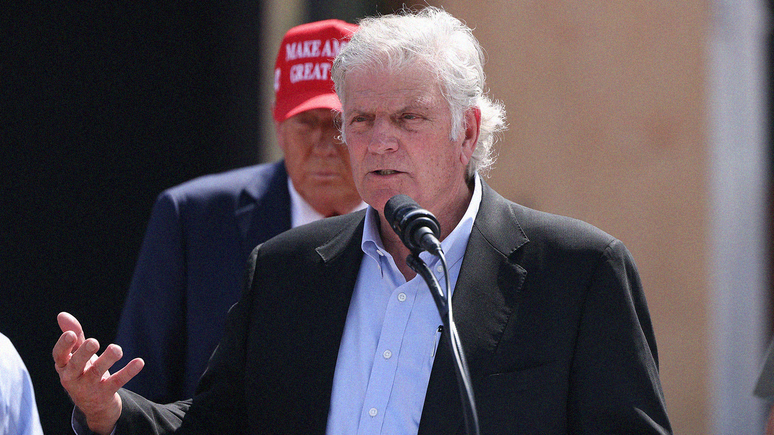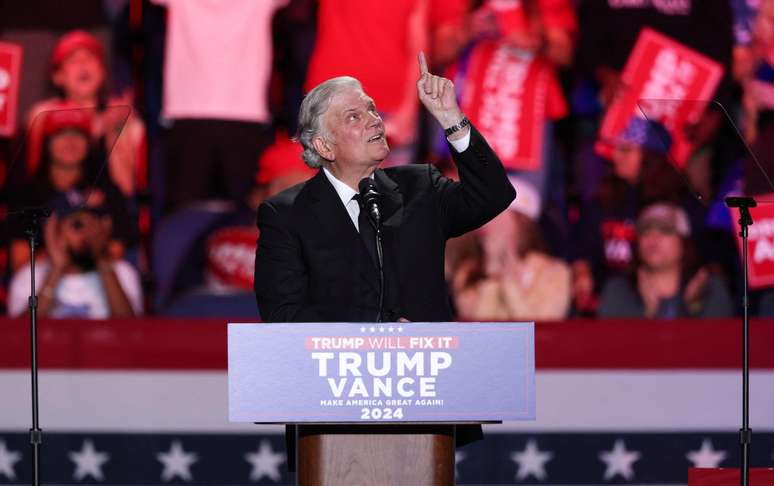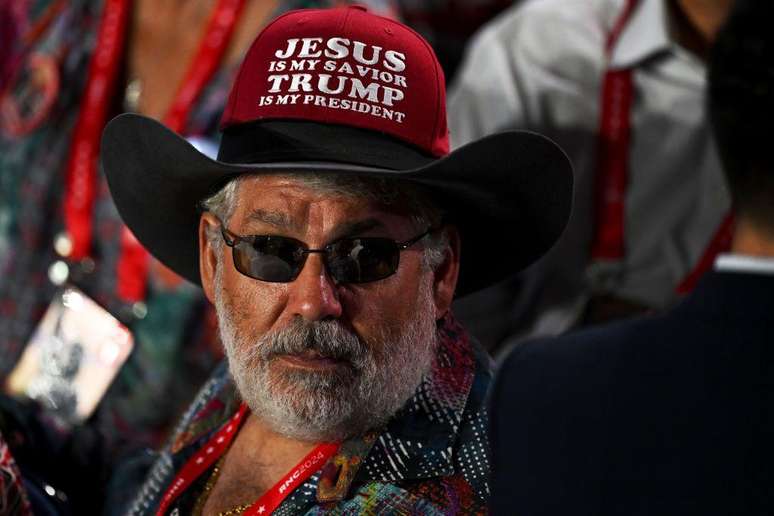Many believers see Trump as their hope as more Americans turn away from religion
On stage at a Florida convention center on election night, with a row of American flags in the background and a jubilant crowd before him, Donald Trump declared: “Many people told me that God spared my life for a reason , and that reason was to save our country and restore America to greatness.”
This was one of the most striking messages of his campaign: the idea that he was chosen by God.
However, even before the July 13 attempt on his life in Butler, Pennsylvania, millions of Americans felt moved by faith to support the former president.
Some viewed the election in apocalyptic tones, comparing Trump to a biblical figure. Last year in the Christian program Flash pointtelevangelist Hank Kunneman described the situation as “a battle between good and evil” and added, “There’s something about Trump that the enemy fears: It’s called the anointing.”

Jim Caviezel, actor who played Jesus in the film The Passion of Christby Mel Gibson, proclaimed, albeit in jest, that Trump was “the new Moses”, the one who, according to the Bible, led the exodus from Egypt. In the months leading up to the election, many of his supporters began referring to him as a “savior.”
The question is: why? What makes so many people see in this man, who is not known to have particularly strong faith, someone sent from God?
And what does this reveal about Christianity more generally, in a country where the number of believers is rapidly declining?
“We all sin”
The Reverend Franklin Graham, one of the best-known evangelists in the United States and son of Billy Graham, considered by many to be the country’s most famous preacher, is one of Trump’s staunchest supporters. He is convinced that there is no doubt: the president-elect was chosen by God for this mission.
“The bullet that went through his ear came within a millimeter of his brain and his head turned at the last second as the shot was fired,” Graham says. “I believe it was God who turned his head and saved his life.”
Questions raised about Trump’s character – including allegations of sexual misconduct and his alleged affair with adult film actress Stormy Daniels, as well as the secret trial – do not shake Graham’s belief.
“Remember when Jesus said to the crowd, ‘Let he who is without sin cast the first stone,’ and little by little everyone began to leave? We have all sinned.”

Part of the reason some Christians may find it easier to ignore questions of Trump’s character is that he kept one specific promise during his first term: appointing anti-abortion justices to the U.S. Supreme Court.
For Reverend Graham, this is proof that the president-elect is a man of integrity.
“This is a great victory for Christians, especially evangelicals,” he says. “We believe the president will stand up for religious freedom, which Democrats would not do.”
The choice of Mike Huckabee as ambassador to Israel already suggests that faith could influence some of foreign policy. American evangelicals, including Huckabee, are among Israel’s most ardent supporters.
Many of them believe that Jews must occupy the entire region of biblical Israel – including what is now the occupied West Bank and Gaza – to trigger events that would lead to the Second Coming of Jesus Christ.
Religion in rapid decline
In the past, Donald Trump has mentioned having a Presbyterian background. However, despite Christians’ strong support in the elections, in his latest campaign he made no effort to convince them that they are part of the same religious group.
“I think he realized that it would be a bit much to claim that he himself is a religious man. Instead, he took a quid pro quo (‘something given to a person in exchange for something else’, in the English interpretation)“, says Robert Jones, founder and president of the Public Religion Research Institute (PRRI), which has long tracked religious trends in the United States.
This approach focused on demographic change and the decreasing number of believers.
In the early 1990s, about 90% of adults in the United States identified as Christian, a percentage that dropped to 64% by the start of this decade, accompanied by a sharp increase in the number of people with no religious affiliation, according to the Pew. Data Research Center.
According to Jones, this was something Trump knew how to exploit.
“Trump’s message was, ‘I know you are in decline, I know your numbers are declining. I know your children and grandchildren no longer attend your churches, but if you elect me, I will bring power back to the Christian churches.'”
However, not all American Christians were convinced of this. For some, faith has led them to have diametrically opposed impressions of Trump.
“Trump devalued and degraded”
In recent months, from the pulpit of Bible Ways Ministries in Atlanta, Georgia, the Rev. Monte Norwood has shared a very different message than Franklin Graham’s.
He, for example, was devastated by the results of last week’s elections.
“Trump has devalued and degraded just about everyone he could, from immigrants and minorities to women and people with disabilities,” she says.
“White conservative Republican Christianity that ignores character is simply hypocritical.”
He has long opposed the idea of a second Trump presidency and has expressed this position on social media and through activism, encouraging voter participation, such as helping other black voters register and access free transportation to polls. urns.
“I am a Christian like the one in Matthew chapter 25, where Jesus said, ‘When I was hungry, you gave me something to eat; when I was thirsty, you gave me something to drink.’”
The model of the Christian vote in history
PRRI research has analyzed voter rolls throughout history, not only by religious practice and belief, but also by race, and found that when it comes to political opinions, there has been a clear trend for decades.
“Almost without exception, white Christian groups tend to vote Republican in presidential elections,” Jones says. “Non-white Christian groups, non-Christian groups, and voters with no religious affiliation tend to vote for the Democratic Party.”
This model dates back to the 1960s, he adds, when the Democratic Party became associated with the civil rights movement and white Christian groups began to flock to the Republican Party.
Polls conducted before the 2024 election that analyzed voting intentions indicated that, to a large extent, this pattern remained. “According to our polls, the Republican Party is 70 percent white and Christian, while the Democratic Party is only a quarter white and Christian.”
According to the PRRI poll of 5,027 adults, white evangelical Protestant voters were Trump’s biggest supporters, with 72% favoring him versus 13% for Kamala Harris. White Catholic voters also supported Trump, with 55% supporting him and 34% aligning with Kamala. “Mainline” Protestants (a branch of Protestantism characterized by a liberal stance) and non-white evangelicals showed a similar divide.
In contrast, 78 percent of black protesters supported Kamala, while only 9 percent supported Trump, according to the poll. According to the PRRI, Kamala’s supporters also included American Jews, voters with no religious affiliation, and other non-Christian Americans.

As regards effective voting, signs of change in family models have emerged.
The Michigan results showed a clear migration of Muslim voters to the Republican Party in the state, likely as a result of the Biden administration’s role in supporting Israel in the war on Gaza.
The analysis also indicates that Latino Catholics voted for Trump more than expected, when they previously tended to align with the Democratic Party.
Economic hardship, caused by rising inflation, among other factors, likely pushed “non-traditional” GOP voters to vote for Trump.
As for his appeal to traditional Christians, Jones argues that there was a religious component to the idea of ”Making America Great Again,” with the promise of restoring the country’s Christian character.
“His campaign was about resentment and loss and nostalgia,” Jones says, “and that includes nostalgia from a faith perspective.”
The future of faith in the USA
Despite his political strength, one thing Trump cannot do is stop the tide of demographic changes in the United States, including the abandonment of faith.
Although the number of people who identify as “atheists” is still lower than in many Western countries, the number of people who say they have “no religious affiliation” is growing.
There is a generational component to this, along with the familiar tendency that personal economics provides greater autonomy for people to depart from the accepted norms of their communities. But there are also other reasons.
One-third of American atheists or agnostics say they have drifted away from their childhood religion because of high-profile sexual abuse scandals involving the Church, according to a PPRI study.
In 2020, the Catholic Church released lists of living clergy members in the United States accused of abuse, including some related to child pornography and rape. There were about 2 thousand names.
Two years later, the Southern Baptist Conference, which brings together Protestant churches in the US, published a list of hundreds of religious leaders accused of child abuse between 2000 and 2019.
This reveals the scale of the problem Trump faces. However, Franklin Graham remains optimistic.
“Church attendance isn’t going to go up next week because President Trump gets elected, but what I think that means is that the legislation that we might see coming that would make life more difficult for people of faith isn’t coming,” he says, referring to the possibility of more progressive legislation, such as that concerning, for example, abortion and the rights of gay and trans people.
“It will protect people of faith, it will protect religious freedoms in this country. I’m not just talking about Christian religious freedoms… [mas] of all men of faith.”
As for whether he is right, Americans can only watch and wait. But just as some celebrate the promise of a Christian-influenced government, others are certainly concerned.
Source: Terra
Rose James is a Gossipify movie and series reviewer known for her in-depth analysis and unique perspective on the latest releases. With a background in film studies, she provides engaging and informative reviews, and keeps readers up to date with industry trends and emerging talents.






